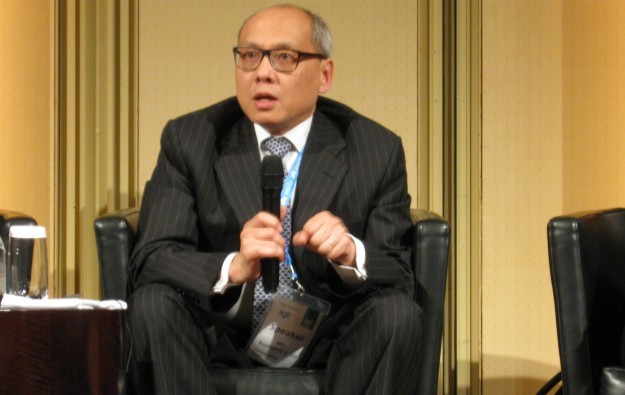Funding Japan IRs via balance sheets a no-no
May 16, 2014 Newsdesk Japan, Latest News, Top of the deck

It’s unlikely that Japanese companies or outside investors would finance a multi-billion U.S. dollar casino resort in that country solely via their corporate balance sheet, suggested a lawyer specialising in capital market transactions and speaking during the Japan Gaming Congress in Tokyo.
Major Japanese corporations own more than 225 trillion yen (US$2.2 trillion) of low-yielding Japanese government bonds according to the Bank of Japan. The fact such corporations currently have more cash than debt is an indicator of the dearth of domestic investment opportunities.
Gaming industry analysts are now starting to recalibrate potential returns on invested capital for Japanese casinos – possibly to 10 to 15 percent rather than the 20 percent hoped for by some operators. But even that level would potentially be extremely attractive to Japanese firms, following two decades of economic stagnation.
But Raymond Y. Lin (pictured), a New York City-based attorney for Latham & Watkins LLP, also focusing on representing private equity firms in mergers and acquisitions, downplayed suggestions that cash rich Japanese corporations might seek to pay for such projects solely from their balance sheets.
Mr Lin told a session on the integrated resort business model moderated by Andrew Gellatly of Gambling Compliance: “While you can finance using your own balance sheet, that involves a lot of risk. That means putting all of your capital at risk.
“Typically IRs [integrated resorts] are financed on a project finance basis. The only capital at risk is the capital invested in that particular project. And most developers don’t want to put all of their eggs in one basket,” he said.
“That’s why there’s only a limited amount of capital that people are willing to put into one project. They would like to spread that risk by especially the use of loans and other products.”
Figures of up to US$10 billion have been mentioned as the price tag for a single integrated resort in Japan. That would be around double the cost of the most expensive single project so far in Macau, and would beat even the US$8.5 billion cost of MGM Resorts International’s CityCenter project in Las Vegas, which was launched in 2009 into the worst U.S. recession in 80 years and still weighs on that company’s balance sheet.
Mr Lin said that creating expectation of high returns on major capital projects can create issues not only for investors, but also with governments.
He stated: “The moment you get to assume that a project is wildly profitable, my experience has been that regulators come in and say ‘Oh, this is going to be so profitable, we’ll layer ‘this’ on to achieve ‘that’ goal, and it will cost them just a little bit more to do that’.
“Then you end up with a project that has so many additions to the regulatory layer and creates so many additional costs for the operator, that they [the investor] will not be at the level of profitability you would expect. That’s what we have to worry about.”
Related articles
-
 Universal Ent raises US$800mln to...
Universal Ent raises US$800mln to...Jul 24, 2024
-
 AGI flags 2024 US$172mln capex for...
AGI flags 2024 US$172mln capex for...Jul 19, 2024
More news
-
 Donaco EBITDA up y-o-y to above US$4mln...
Donaco EBITDA up y-o-y to above US$4mln...Jul 26, 2024
-
 HK listed Palasino upgrades Czech...
HK listed Palasino upgrades Czech...Jul 26, 2024
Latest News
Jul 26, 2024
Border-casino operator Donaco International Ltd has achieved a 164.17-percent year-on-year increase in its latest quarterly group earnings before interest, taxation, depreciation and amortisation...Sign up to our FREE Newsletter
 (Click here for more)
(Click here for more)
Pick of the Day
”We’ve got more traction outside of Macau at the moment. But Macau’s going be a bigger focus for us”
David Punter
Regional representative at Konami Australia
Most Popular
 Sheraton brand to exit Londoner Macao, to be Londoner Grand July 25, 2024
Sheraton brand to exit Londoner Macao, to be Londoner Grand July 25, 2024  Macau regulator probes unlicensed gaming agents July 24, 2024
Macau regulator probes unlicensed gaming agents July 24, 2024  Philippines gives 20k aliens in POGOs 60 days to leave July 25, 2024
Philippines gives 20k aliens in POGOs 60 days to leave July 25, 2024  Philippines-listed DigiPlus says not affected by POGO ban July 24, 2024
Philippines-listed DigiPlus says not affected by POGO ban July 24, 2024  Sands China 2Q EBITDA down q-o-q amid low hold, renovation July 25, 2024
Sands China 2Q EBITDA down q-o-q amid low hold, renovation July 25, 2024






